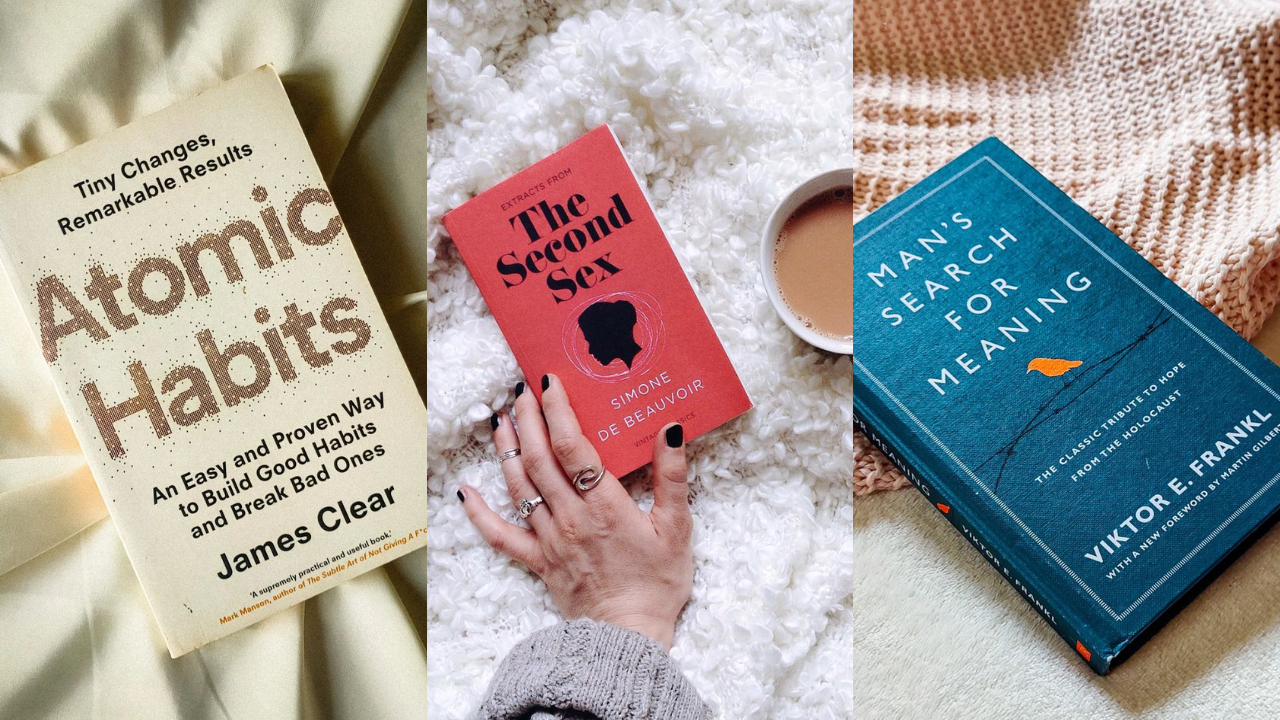13 Timeless Non-Fiction Books Worth Reading Again and Again
Unearth the profound insights of thirteen non-fiction gems that promise to transform your perspective on life, success, and self-discovery with every read.

13 Timeless Non-Fiction Books Worth Reading Again and Again (Picture Credit - Instagram)
In the broad expanse of nonfiction writing, certain works stand out as pillars of wisdom, providing insights that inspire us to return to their pages time and again. These works provide timeless wisdom that is useful throughout generations. Here are 13 non-fiction books that are not only worth reading, but also worth revisiting for their profound insights about life, success, and human nature.
Read More: 13 Non-Fiction Books for Every Stage of Life
1. Man's Search for Meaning by Viktor E. Frankl
In 'Man's Search for Meaning,' Viktor E. Frankl describes his experiences in Nazi concentration camps with remarkable insight and contemplation. Beyond a simple survival story, Frankl offers logotherapy, a therapeutic technique that believes that the need to find meaning in life is the basic motivator in humanity. He contends that even in the most dire circumstances, life has the possibility for meaning and that our fundamental goal is not pleasure (as Freud proposed) or power (as Adler proposed), but the pursuit of what we consider significant. This seminal work is a compelling meditation on the human ability for perseverance and the never-ending search for meaning, providing solace and wisdom to readers dealing with life's trials.
2. The Diary of a Young Girl by Anne Frank
'The Diary of a Young Girl' is a heartbreakingly intimate look at the atrocities of war and the light of the human spirit that shines even in the darkest hours. Written by Anne Frank while hiding from the Nazis, this journal is a unique account of youth, growth, and dreams set against the backdrop of World War II. Frank's genuine thoughts on her inner world and the sharp contrast with her exterior reality serve as a timeless monument to the human heart's resiliency. Her hopes, anxieties, and astute insights extend beyond the bounds of her secret annexe, reminding readers of the unwavering hope that humanity can triumph even in the most tragic circumstances.
3. Sapiens: A Brief History of Humankind by Yuval Noah Harari
'Sapiens: A Brief History of Humankind' is a comprehensive look at the history and impact of Homo sapiens on the earth. Yuval Noah Harari uses history, science, and philosophy to investigate how humans have evolved and shaped the world and ourselves. Harari encourages readers to contemplate the repercussions of our dominance, from the rise of cognitive thought to the agricultural revolution and finally to the unification of humanity through trade, religion, and politics. This book provides an engaging look at where we've come from and raises important questions about where we're going.
4. The Immortal Life of Henrietta Lacks by Rebecca Skloot
'The Immortal Life of Henrietta Lacks' tells the story of an African American woman whose cells were harvested without her consent in 1951, resulting in tremendous medical advancements. Rebecca Skloot deftly navigates the crossroads of medical innovation, ethics, and racism, revealing how Lacks' HeLa cells contributed to vital scientific achievements while her family remained anonymous and impoverished. This investigative tale not only illuminates the human stories behind scientific triumphs, but also generates an important discussion about consent, racial injustice, and the personal consequences of medical research. Skloot's captivating account connects science and human emotion, making Henrietta Lacks' legacy memorable.
5. The Soul of a New Machine by Tracy Kidder
Tracy Kidder's 'The Soul of a New Machine' delves into the fierce, competitive world of computer engineering in the late 1970s. This Pulitzer Prize-winning story centres on the dedicated team at Data General Corporation working to create a next-generation minicomputer. Kidder expertly conveys the interpersonal drama, technical hurdles, and sheer resolve that drive the crew. The book uses extensive storytelling to show not only the technical aspects of computer invention, but also the passion, tension, and teamwork involved. It's an engrossing read that demonstrates the combination of human imagination and perseverance behind the cold precision of science, making it a timeless study of innovation and ambition.
6. Silent Spring by Rachel Carson
Rachel Carson's breakthrough work, 'Silent Spring,' is credited with initiating the global environmental movement. Published in 1962, it methodically describes the negative impacts of indiscriminate pesticide usage on the ecosystem, notably birds. Carson's convincing, elegant writing and ability to synthesise scientific knowledge for a general audience made the book a bestseller and a source of contention. Her call to action prompted a rethinking of environmental policies and practices, emphasising the interdependence of all living things and the influence of human actions on the natural world. Carson's legacy continues to inspire environmental activism and awareness, demonstrating the lasting impact of her remarks.
7. A Brief History of Time by Stephen Hawking
In 'A Brief History of Time,' Stephen Hawking demystifies the complexity of cosmology and astrophysics for the general audience, bringing readers through topics like black holes, the Big Bang, and the nature of time itself. Hawking's greatness resides in his ability to explain the universe's secrets in understandable terms without oversimplifying the science. This seminal work not only broadens our grasp of the universe but also prompts us to consider our place in it. Hawking's discoveries and fascinating life story continue to pique and inspire interest in the universe and our quest to understand it.
8. Outliers: The Story of Success by Malcolm Gladwell
In 'Outliers,' Malcolm Gladwell takes a bold look at what distinguishes outstanding achievers, contending that human achievement is not primarily determined by IQ or talent. Gladwell provides persuasive evidence that culture, time, upbringing, and even luck all play important factors in moulding people's success stories. Gladwell questions conventional wisdom about how people attain incredible levels of success through compelling stories ranging from the Beatles to Bill Gates. This book invites readers to consider the larger context of their lives and the different external circumstances that contribute to success, providing a more nuanced understanding of how outliers emerge.
9. The Year of Magical Thinking by Joan Didion
Joan Didion's 'The Year of Magical Thinking' is a fresh and uncensored look at the turbulent year that followed the sudden loss of her husband, John Gregory Dunne. This book navigates the geographies of loss, memory, and survival with searing honesty and literary grace. Didion examines the dynamics of sorrow and the surreal state of mind that comes with the loss of a loved one. Her story conveys the profound sense of displacement and the search for purpose in the aftermath of catastrophe. Didion's writing, which provides a global map of grief's landscape, is a moving reflection on love, loss, and the human capacity to persevere and find meaning in the aftermath of tragedy.
10. Guns, Germs, and Steel: The Fate of Human Societies by Jared Diamond
Jared Diamond's 'Guns, Germs, and Steel' is a captivating blend of history, biology, ecology, and linguistics that presents a new theory about the evolution of human societies. Diamond contends that the varied destinies of continents and peoples during the previous 13,000 years were influenced not by racial differences, but by environmental and geographical variations. He investigates how the domestication of plants and animals, the availability of suitable agricultural land, and the spread of viruses and technologies have altered the global balance of power. This well-researched book offers an intriguing viewpoint on the complicated web of causes that have resulted in the society we know today, questioning preconceived beliefs about culture and advancement.
11. The Second Sex by Simone de Beauvoir
Simone de Beauvoir's 'The Second Sex' is a seminal work of feminist philosophy that methodically examines the formation of women as the "Other" in a patriarchal society. De Beauvoir digs into history, biology, psychoanalysis, and literature to uncover the mechanisms that have marginalised and defined women in comparison to men. Her investigation into female identity, sexuality, and oppression not only provided the groundwork for modern feminist theory but also demanded an urgent reevaluation of gender norms. By pushing for women's autonomy and liberation, "The Second Sex" remains a forceful call to action, inspiring future generations to challenge and destroy systematic inequities.
12. Atomic Habits by James Clear
James Clear's 'Atomic Habits' is a detailed guide to understanding the mechanics of habits and how minor modifications can lead to dramatic effects. Clear believes that the quality of our life is dictated by our behaviours. With convincing facts and actual experiences, he outlines habit formation tactics that emphasise tiny changes, the compounding influence of everyday routines, and overcoming typical obstacles to progress. Clear's philosophy emphasises the importance of systems above objectives, demonstrating how focusing on the process rather than the result may lead to success and self-improvement. "Atomic Habits" is a transforming book for anyone who wants to master the small behaviours that lead to big changes.
13. The Richest Man in Babylon by George S. Clason
George S. Clason's 'The Richest Man in Babylon' is a timeless classic that teaches financial lessons through a series of parables set in ancient Babylon. These stories, which include lessons on personal money management, saving, and investing, have helped generations achieve financial independence. Clason emphasises values such as living below one's means, obtaining knowledge to make prudent investments and the necessity of creating passive income. Through entertaining narratives, he conveys the idea that everyone who follows basic financial principles may achieve financial prosperity. This book is a staple of personal finance literature, providing practical guidance for financial success and wealth creation.
Read More: 13 Non-Fiction Books for Every Stage of Life
These 13 works provide deep, multilayered perspectives on the human condition, society, and personal development. With each reading, fresh insights arise, reflecting the changing views we bring as we progress through life. They remind us of literature's timeless ability to inform, challenge, and inspire.
Trending:
End of Article
Subscribe to our daily Lifestyle Newsletter!
Related News





From Dune to Poor Things, 5 Book Adaptations to Watch This Weekend

5 Paul Aster Fiction Novels That Were Entirely Genre-Defying

Textile Printing Technique Of Ajrakh From Kutch Gets GI Tag

8 Clever Ways to Utilise Bedroom Corners

The History Of Lonavala's Iconic Chikki And 5 Places You Should Try









